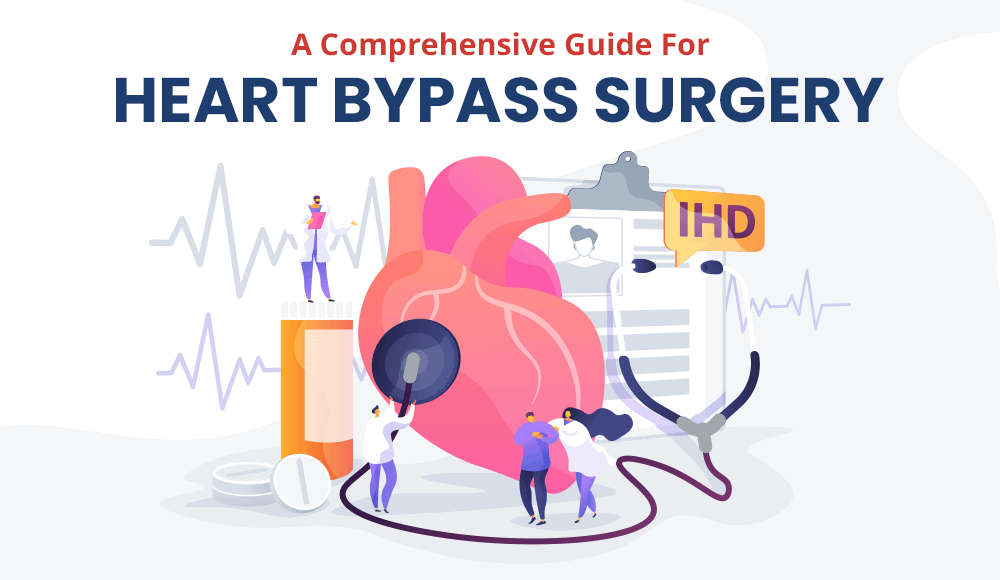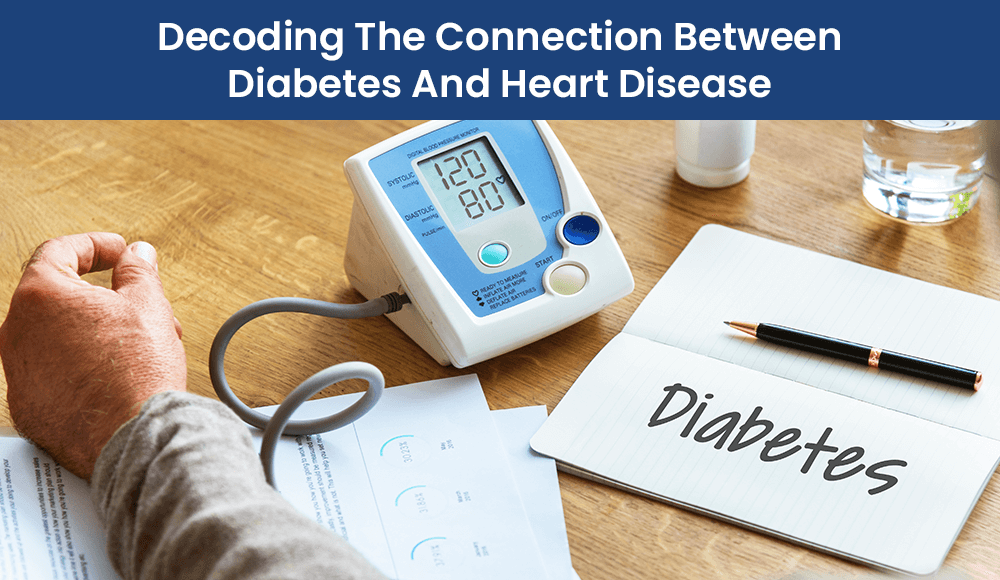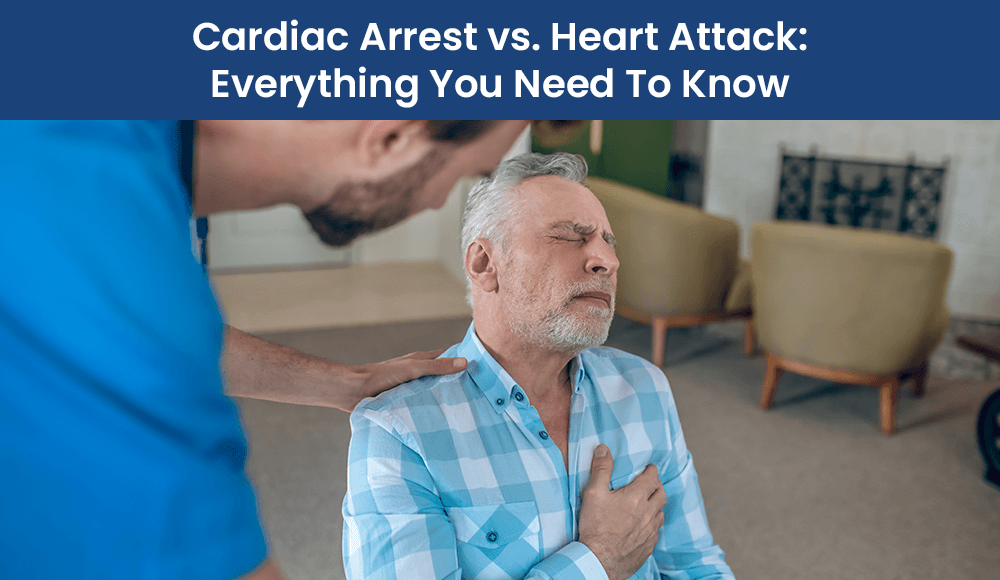
Coronary artery bypass grafting (CABG), also known as Bypass Surgery, is a procedure used to restore the blood flow to the blocked arteries of the heart. In bypass surgery, arteries from inside the chest and sometimes the leg and the arm are utilized as conduits to bypass the blockages in the heart.
In our comprehensive guide for heart bypass surgery, we’ll cover everything you need to know about heart bypass surgery, including its advantages, when to perform the surgery, tests before bypass surgery, the types, and the complications that may arise as a result of post-bypass surgery care.
This information about heart bypass surgery will help you prepare for heart bypass surgery.
Want to know more about heart bypass surgery and whether it’s right for you?
A] Advantages of Heart Bypass Surgery
Bypass surgery is performed to relieve chest pain and increase blood flow to the heart muscle. It prevents damage to the heart muscle, improves the quality of life and reduces the risk of death.
B] When To Perform Bypass Surgery
Research has shown that in the presence of complex blockages, left main disease (blockage in the main artery of the heart), low pumping capacity of the heart and in diabetic patients, bypass surgery seems to offer the best long-term results.
This should be a satisfactory answer to your query, how to know if you need bypass surgery. People with heart diseases and poor heart function may need to undergo this surgery.
C] Before Heart Bypass Surgery
Since heart bypass surgery is a major surgical procedure, a person has to undergo a series of tests and preparations.
Doctors will recommend tests such as Echocardiogram, Electrocardiogram (ECG), complete blood count, exercise street test, and x-ray or CT scan angiography.
D] Two Types Of Bypass Surgery
1. Beating Heart Bypass Surgery
Beating heart bypass surgery is done on a beating heart without the use of a heart-lung machine. This technique is particularly useful in high-risk patients with serious organ dysfunction before surgery and is also associated with a lower risk of blood transfusions. With an experienced team, 90% of the bypass surgery cases can be performed on the beating heart.
2. On Pump Bypass Surgery
On pump bypass surgery or conventional bypass surgery is performed with the use of a heart-lung machine. In patients with rhythm disturbances of the heart and low blood pressure, On pump bypass surgery may offer better outcomes.
E] Complications That May Arise Due To Heart Bypass Surgery
Like most surgical treatments, heart bypass surgery comes with its own set of risks. Most of the risks associated with heart surgeries have been eliminated by the latest technological advancement that has helped improve the procedure.
Even with that information at hand, it is necessary to go into the surgery with your eyes open, which means understanding the complications associated with the disease. Some of the complications that may arise after your heart bypass surgery include heart rhythm disturbances, kidney dysfunction, bleeding, infection, and blood clots.
Keep in mind that overall heart bypass surgeries are relatively safe. Many people who have undergone heart bypass surgery get relief from the procedure and do not have to rely on medicines in the long run.
F] Approaches/ Conduits For Bypass Surgery
Typically, a blood vessel from inside the chest and the leg/ arm is used to bypass the blocked vessels in the heart. Utilizing two blood vessels from inside the chest, known as bilateral internal mammary arteries, can be done depending on the patient’s factors and the surgeon’s preference. This approach has been shown to offer better long-term outcomes as the patency of the arteries is superior than the veins. The cost of heart bypass surgery is on the higher end due to the complexity of the procedure.
G] Post Bypass Surgery Care
1. Post Bypass Surgery Care At the Hospital
After the bypass surgery, patients are in the ICU for 2-3 days and then are transferred to the ward. The total duration of the stay in the hospital is usually 4-7 days, and within 2-3 weeks, patients can resume their normal duties.
After surgery, the patient needs to participate in cardiac rehabilitation. If you live in Mumbai, schedule regular visits with your cardiovascular surgeon in Mumbai and follow a heart-healthy diet.
2. Post Bypass Surgery Care At Home
In order to understand post heart surgery care, you can refer to our guide: Do’s And Don’ts Of Recovering From Heart Surgery. It lists things you should do and things you should avoid while you are recovering from heart surgery, such as heart bypass surgery or heart transplant surgery.
H] We’ll also quickly summarize things that you have to take care of post bypass surgery
1. Taking proper care of the wound:

It’s important to keep the wound clean. You can simply clean it with soap and water. If the wound appears red or starts oozing more than usual, you should seek out your doctor, who can help disinfect the wound.
2. Recovering appetite after surgery:

You might experience poor appetite in the first few weeks. However, there is no cause to worry. Your appetite should return in a few weeks. You only need to get in touch with your doctor if it doesn’t. Meanwhile, you should focus on eating healthy nutritious food that can help you recover quicker.
3. Easing into activities:

After the first 2-3 weeks, a person can return to their normal household chores. However, it would be prudent to ease into these activities rather than leaping. Let your body gradually build up endurance and regain momentum.
4. Falling back into a normal sleeping pattern:

Want to know more about heart bypass surgery and whether it’s right for you?
Some people have trouble falling asleep after heart surgery, an issue that seems to disappear within a few months. There are few things that you can do in order to get better sleep. For example, you could avoid drinking caffeine or sodas or eating chocolates before bed.
We have shared exhaustive information about bypass surgery for your reference. Following the guidelines mentioned in this guide can help speed up your heart bypass recovery post surgery. Prior to heart bypass surgery, many patients experience symptoms such as chest tightness and shortness in breath. Many patients with heart conditions also have to deal with elevated blood pressure levels.
As we have already seen, a heart bypass surgery will in many cases treat these symptoms and improve them in others. It will ultimately improve the quality of your life. However, in order to improve the quality of your life further, you’ll have to make certain lifestyle changes recommended by your doctor.
If you are facing heart difficulties, we encourage you to visit a reputed heart bypass surgeon in Mumbai without any hesitation.




[…] rate of heart bypass surgery with a 1% mortality rate. You can learn more about the surgery from our Guide for Heart bypass surgery. As of today, this surgery is safer than those on other vital organs. Experts can help you clear […]
[…] health parameters. Ensure that you never miss or postpone any of these appointments. Check out the guide for bypass surgery to get a comprehensive […]